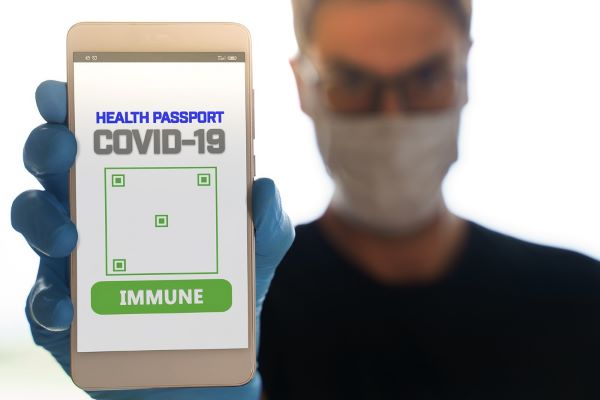UAE Khalifa University researchers develop digital immunity passports on Ethereum blockchain

Designed to help people prove they have been vaccinated against Covid-19, digital immunity passports may help significantly control the virus’ spread while allowing normal life to re-emerge. As such a new strategy is being proposed that may significantly help control the virus’ spread while allowing normal life to re-emerge. The new strategy focuses on identifying and documenting people’s immunity, or their inability to infect others, with so-called ‘immunity passports.’
A digital immunity passport is a digital document detailing a person’s test results proving he or she is not considered a risk in spreading the virus. This accounts for people who have tested negative for the disease, have been vaccinated, or are otherwise immune to Covid-19. These passports will likely take the form of apps as outlined by a team of researchers at Khalifa University.
Haya R. Hasan, Research Associate, Dr. Khaled Salah, Professor, and Dr. Ibrar Yaqoob, Post-doctoral Research Fellow, from the KU Department of Electrical Engineering and Computer Science, with Dr. Mohammed Omar, Professor, and Dr. Raja Jayaraman, Associate Professor, from the Department of Industrial and Systems Engineering, collaborated with Dr. Junaid Arshad, Associate Professor at Birmingham City University, and Dr. Samer Ellahham from the Heart and Vascular Institute, Cleveland Clinic Abu Dhabi, to develop a blockchain-based solution for Covid-19 digital medical passports and immunity certificates. Their work was published in IEEE Access.
“Covid-19 has had an unprecedented impact on human life across the world,” said Dr. Salah. “Highly contagious, this disease has affected a significant proportion of the world population with a very large number of infections and deaths. Although the symptoms, which are similar to those of the influenza virus, vary in severity across people and not all people infected with the disease show symptoms. Some infected people are known as silent carriers or silent spreaders, which makes effective and verifiable testing paramount to a successful response to Covid-19.”
Immunity certification could prove valuable in settings where there is a high risk of transmission, such as large gatherings of people at sports events or during travel. The virus has wreaked particular havoc on the travel industry and so digital immunity passports may present a potential lifeline to that industry. Designed to help people prove that they have been tested and that the test results belong to them, but without having to share any personal information, an immunity passport requires verifiable and trustworthy testing and concrete security.
“The government’s response strategy is evolved and implemented based on data related to infections collected by regional units,” explained Dr. Salah. “Such data relies on clinical diagnosis conducted by hospitals and other specialized facilities, but the presence of multiple intermediaries in this process causes delays in reporting time, which limits hospitals and testing centers from promptly reporting infections. Furthermore, the layered structure in reporting lines can lead to discrepancies, affecting the overall response strategy and its effectiveness in mitigating against the disease.”
The KU research team addressed the challenge of accurate and timely reporting of Covid-19 infections using blockchain technology to aid response strategies against the disease. Their solution uses programmable Ethereum smart contracts hosted on the blockchain to create a digital medical passport. Blockchain technology offers an immutable and tamper-proof ledger of data and transactions as a shared database, validated by a wide community. Each record created forms a block, and as each block is confirmed by the community, it is paired up with the previous entry in the chain, creating a chain of blocks. Blockchain could be used to confirm a person’s immunity to Covid-19 in a way that is decentralized, trusted, and secure, with tamper-proof records, logs, and transactions.
“Digital health passports are a crucial mode of identification which can help mitigate the spread of contagious diseases,” explained Dr. Salah. “The smart contracts securely store the patient’s vaccination and immunization records as well as their medical and travel history, which is authenticated by the Ministry of Health and Ministry of Foreign Affairs for international usage. The patient’s personally identifiable information is completely secure, as disclosure is delegated to the owner of the information—the patient.”
Internationally, the biggest hurdle for the introduction of immunity passports is the scientific knowledge about Covid-19 itself. It is still unclear exactly how accurate antibody tests are, and when antibodies are detected, how long they remain in someone’s body. However, while the medical community continues to understand the nature of immune responses to Covid-19, researchers are building platforms and solutions on which to host digital immunity passports.
“For our purposes, we envisaged an immunity certificate to verify that a person has developed relevant antibodies to mitigate against Covid-19 and is consequently unable to infect other people,” explained Dr. Salah. “Whether this was from vaccination or previous infection is the medical aspect of this challenge and outside our scope. For us, people with these certificates can have them saved to their smart contract by a testing center or hospital and the time frame for immunity would also be included.”
In the team’s design, these smart contracts can generate events to notify patients and test-takers about medical updates with quarantine information or details on the medical tests they have completed. Health authorities are important stakeholders in this solution, representing legitimate testing and real results, and providing accurate information to the immutable blockchain.
As for privacy, every individual’s biometric information is associated with their unique Ethereum Address on the blockchain to maintain privacy. Users can control access to their sensitive information, including their identities and other credentials. The blockchain maintains authentication, trust and privacy, and allows users to share information as necessary when needed. At the same time, the solution offers security and transparency for international use.
“Our solution tackles an important problem where the travel history and medical history of a Covid-19 test taker or patient can be traced and tracked easily,” explained Dr. Salah. “Using the immutable logs, a patient can safely engage in social activities and institutions, while community managers and verified stakeholders can access immunization records in an efficient and trusted way.”
Khalifa university has been at the forefront of Blockchain technology and in December launched its Ankabut network on the Blockchain




